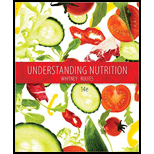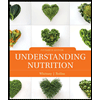
LMS Integrated for MindTap Nutrition, 1 term (6 months) Printed Access Card for Whitney/Rolfes Understanding Nutrition
14th Edition
ISBN: 9781305407169
Author: Eleanor Noss Whitney, Sharon Rady Rolfes
Publisher: Cengage Learning
expand_more
expand_more
format_list_bulleted
Question
Chapter 5, Problem 1BCTQ
Summary Introduction
To explain: The relation between dietary fats and heart health.
Introduction: Some fats will help to promote good health. Fat is essential for the health because it supports a number of body functions. Dietary fats are the fat that is found in food from the plants and animals.
Summary Introduction
To explain: The way in which diverse diets can have similar health outcomes.
Introduction: Diet is the sum of food consumed by a person or other organism. A healthy diet helps to maintain or improve the overall health of the body. Different types of diets are there and they provide the body with essential nutrition.
Expert Solution & Answer
Want to see the full answer?
Check out a sample textbook solution
Chapter 5 Solutions
LMS Integrated for MindTap Nutrition, 1 term (6 months) Printed Access Card for Whitney/Rolfes Understanding Nutrition
Knowledge Booster
Similar questions
- Effects of Dietary Fats on Lipoprotein Levels Cholesterol that is made by the liver or that enters the body from food does not dissolve in blood, so it is carried through the bloodstream by lipoproteins. Low-density lipoprotein (LDL) carries cholesterol to body tissues such as artery walls, where it can form deposits associated with cardiovascular disease. Thus, LDL is often called bad cholesterol. Highdensity lipoprotein (HDL) carries cholesterol away from tissues to the liver for disposal, so HDL is often called good cholesterol. In 1990, Ronald Mensink and Martijn Katan published a study that tested the effects of different dietary fats on blood lipoprotein levels. Their results are shown in Figure 2.23. In which group was the level of LDL (bad cholesterol) highest?arrow_forwardEffects of Dietary Fats on Lipoprotein Levels Cholesterol that is made by the liver or that enters the body from food does not dissolve in blood, so it is carried through the bloodstream by lipoproteins. Low-density lipoprotein (LDL) carries cholesterol to body tissues such as artery walls, where it can form deposits associated with cardiovascular disease. Thus, LDL is often called bad cholesterol. Highdensity lipoprotein (HDL) carries cholesterol away from tissues to the liver for disposal, so HDL is often called good cholesterol. In 1990, Ronald Mensink and Martijn Katan published a study that tested the effects of different dietary fats on blood lipoprotein levels. Their results are shown in Figure 2.23. Figure 2.23 Effect of diet on lipoprotein levels. Researchers placed 59 men and women on a diet in which 10 percent of their daily energy intake consisted of cis fatty acids, trans fatty acids, or saturated fats. Blood LDL and HDL levels were measured after three weeks on the diet; averaged results are shown in mg/dL (milligrams per deciliter of blood). All subjects were tested on each of the diets. The ratio of LDL to HDL is also shown. Source, Mensink RP, Katan MB, Effect of dietary trans fatty acids on high-density and low-density lipoprotein cholesterol levels in healthy subjects. NEJM 323(7):43945. An elevated risk of heart disease has been correlated with increasing LDL-to-HDL ratios. Rank the three diets according to their predicted effect on cardiovascular health.arrow_forwardWhich of the following statements is not true? a. Essential nutrients can be synthesized by the body. b. Vitamins are required in small quantities for bodily function. c. Some amino acids can be synthesized by the body, while others need to be obtained from diet. d. Vitamins come in two categories: fat-soluble and water-soluble.arrow_forward
arrow_back_ios
arrow_forward_ios
Recommended textbooks for you
 Understanding Nutrition (MindTap Course List)Health & NutritionISBN:9781337392693Author:Eleanor Noss Whitney, Sharon Rady RolfesPublisher:Cengage Learning
Understanding Nutrition (MindTap Course List)Health & NutritionISBN:9781337392693Author:Eleanor Noss Whitney, Sharon Rady RolfesPublisher:Cengage Learning Biology Today and Tomorrow without Physiology (Mi...BiologyISBN:9781305117396Author:Cecie Starr, Christine Evers, Lisa StarrPublisher:Cengage Learning
Biology Today and Tomorrow without Physiology (Mi...BiologyISBN:9781305117396Author:Cecie Starr, Christine Evers, Lisa StarrPublisher:Cengage Learning Biology: The Dynamic Science (MindTap Course List)BiologyISBN:9781305389892Author:Peter J. Russell, Paul E. Hertz, Beverly McMillanPublisher:Cengage LearningLifetime Physical Fitness & WellnessHealth & NutritionISBN:9781337677509Author:HOEGERPublisher:Cengage
Biology: The Dynamic Science (MindTap Course List)BiologyISBN:9781305389892Author:Peter J. Russell, Paul E. Hertz, Beverly McMillanPublisher:Cengage LearningLifetime Physical Fitness & WellnessHealth & NutritionISBN:9781337677509Author:HOEGERPublisher:Cengage Concepts of BiologyBiologyISBN:9781938168116Author:Samantha Fowler, Rebecca Roush, James WisePublisher:OpenStax College
Concepts of BiologyBiologyISBN:9781938168116Author:Samantha Fowler, Rebecca Roush, James WisePublisher:OpenStax College

Understanding Nutrition (MindTap Course List)
Health & Nutrition
ISBN:9781337392693
Author:Eleanor Noss Whitney, Sharon Rady Rolfes
Publisher:Cengage Learning

Biology Today and Tomorrow without Physiology (Mi...
Biology
ISBN:9781305117396
Author:Cecie Starr, Christine Evers, Lisa Starr
Publisher:Cengage Learning


Biology: The Dynamic Science (MindTap Course List)
Biology
ISBN:9781305389892
Author:Peter J. Russell, Paul E. Hertz, Beverly McMillan
Publisher:Cengage Learning

Lifetime Physical Fitness & Wellness
Health & Nutrition
ISBN:9781337677509
Author:HOEGER
Publisher:Cengage

Concepts of Biology
Biology
ISBN:9781938168116
Author:Samantha Fowler, Rebecca Roush, James Wise
Publisher:OpenStax College